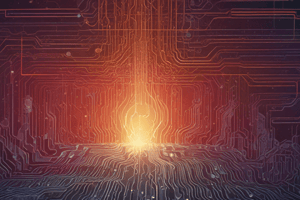Podcast
Questions and Answers
What is the study of current electricity at the nanoscale called?
What is the study of current electricity at the nanoscale called?
- Energy storage
- Nanotechnology
- Nanoelectronics (correct)
- Quantum information
Which area of research involves investigating novel methods for storing and converting electric energy?
Which area of research involves investigating novel methods for storing and converting electric energy?
- High-performance computing
- Biological systems
- Energy storage and conversion (correct)
- Nanoelectronics
What opportunities does Brigham Young University offer to graduate students in the field of current electricity research?
What opportunities does Brigham Young University offer to graduate students in the field of current electricity research?
- Mentored research funding (correct)
- Conducting synchrotron radiation experiments
- Opportunities in quantum technology
- Exploring biological systems
In what field can Graduate Research Assistants at BYU conduct experiments like synchrotron radiation collisions?
In what field can Graduate Research Assistants at BYU conduct experiments like synchrotron radiation collisions?
How does current electricity continue to contribute to our modern world?
How does current electricity continue to contribute to our modern world?
Flashcards are hidden until you start studying
Study Notes
Current Electricity in Physics
Current electricity, a fundamental concept in physics, revolves around the flow of electric charge through a conductor, typically driven by an electric potential difference. To grasp the intricacies of current electricity, we'll delve into its key principles and applications.
Concepts
Current electricity is governed by the following principles:
- Electric current: The rate at which electric charge flows through a conductor is known as electric current, denoted by (I). Current is measured in amperes (A).
- Ohm's Law: The relationship between voltage, current, and resistance is described by Ohm's Law: (V = IR). Here, (V) is the voltage (in volts, V), (I) is the current (in amperes, A), and (R) is the resistance (in ohms, Ω).
- Electric power: The rate at which energy is delivered to or taken from an electric circuit is known as electric power, denoted by (P). Power is calculated as (P = VI) or (P = I^2R).
Applications
Current electricity has a myriad of applications. Some of the most prominent are:
- Electrical circuits: Systems that involve the flow of electric current, comprising voltage sources, resistors, capacitors, inductors, and other components.
- Electrical devices: From electric motors to LED lights, many everyday devices rely on current electricity.
- Electrical networks: Large-scale systems that distribute electric power across wide geographical regions to meet the demands of consumers.
Research
Current electricity is a vast and vibrant field of research, with applications in areas such as quantum information, nanotechnology, and medical physics. Some of the research avenues in this domain include:
- Nanoelectronics: The study of current electricity at the nanoscale, which involves exploring the unique behaviors of materials and devices.
- High-performance computing: Developing ultrafast and energy-efficient electronic devices for next-generation supercomputers.
- Energy storage and conversion: Investigating novel methods for storing and converting electric energy, such as advanced battery technologies and renewable energy sources.
- Biological systems: Exploring the role of current electricity in biological systems, from neuronal communication to gene regulation.
Graduate Research Opportunities
Current electricity is a popular field of research for graduate students. In the United States, for instance, the Department of Physics at Brigham Young University offers mentored research funding to undergraduate and graduate students, which may include current electricity projects. Graduate Research Assistants (GRAs) are given the opportunity to conduct research in various subfields, such as synchrotron radiation collisional experiments, or to expand their expertise in areas like quantum technology.
Through research and innovation, current electricity continues to power our modern world. Whether you're exploring the fundamental principles, developing cutting-edge technologies, or designing innovative solutions, the field of current electricity remains a dynamic and exciting area of study.
Studying That Suits You
Use AI to generate personalized quizzes and flashcards to suit your learning preferences.




